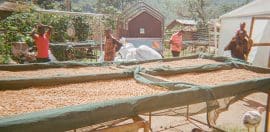Co-op model spreads with vision of sustainability

28 September 2022 at 3:31 pm
Workers are shifting their perspectives on what they want from their work and how they want to impact the world around them, driving a rise in co-op business models and networks.
Earthworker Construction Co-operative, Hope Co-operative, Redgum Cleaning Co-operative and Co-power may all be working towards different societal outcomes, but they’re doing it together.
They don’t just share a business model; the co-ops all come under the umbrella of Earthworker Co-operative, which is building a network of sustainable businesses around the country.
Pro Bono News spoke to the four sister co-ops to find out how they interact and what they’re hoping to achieve.
Earthworker Construction Co-operative
Earthworker Construction Co-operative (ECC) was born out of Earthworker Co-operative and aims to bridge the gap between protecting the environment and saving workers’ jobs.
So far, it comprises a plumber, a couple of carpenters and some workers from the construction space. It will initially work on small carpentry projects before gaining a builder’s licence to move into larger builds, all with sustainability and the environment in mind.
Earthworker Construction Co-operative is looking to establish itself in the Latrobe Valley and generate demand for green building products, while cultivating alternative employment for workers leaving the coal industry.
“There’s people there who have a lot of skills built around coal mining and coal fired power, and those skills can be transferred to other industries,” said ECC spokesperson Zane Alcorn.
“There’s also other industries that are happening alongside coal mining and coal fired power that can be built up as coal gets phased out.”
For example, ECC is looking at manufacturing hempcrete, a green masonry alternative to traditional concrete.
Part of ECC’s mission is to also build up a support network for coal workers as they transition to other industries.
Alcorn said the co-op model was chosen to avoid “reproducing hierarchical structures where there’s a boss or small group of people at the top getting rich off everyone else’s hard work.”
Co-ops, he said are “all about democracy”.
“Everyone within the co-op has a say over how it is run and everyone in the co-op benefits. And then there’s the social projects that the co-ops will reinvest that surplus into. It’s not just about making money for members, it’s also about when we make a profit, what social causes can we reinvest some of that into?”
ECC is currently crowdfunding to get the tools and insurance it needs to set up its construction business.
Redgum Cleaning Co-operative
Spokesperson Madeline said Redgum is transforming the typically casualised industry of cleaning, providing autonomy and meaningful work to its growing army of members.
More than just a cleaning business, Redgum was founded to provide its workers with positive working conditions and a sense of collaboration ownership.
Worker wellbeing is the “most important part of the equation”, Madeline said.
As a services-based co-op, outwardly Redgum operates as a traditional business; but decisions about the day to day running of the organisation are made collectively by member-employees, who decide things like which type of clients to take on and what the division of labour will look like for the next fortnight.
When people become members of Regum, they are provided with training on cooperative governance as well as the nuts and bolts of cleaning. In this way, Madeline explained, members are taught all they’ll need to know once they become fully-fledged voting members.
Like other co-ops, Redgum puts its surplus profit into social good, with members voting on where to distribute it to.
“A big part of Reagan’s ethic is to be interconnected with community groups and other enterprises, and we kind of envisage that happening in a range of ways, with one of the most important being redistribution of funds,” Madeline said.
As part of the Earthworker network, many of Redgum’s members are also members of Earthworker.
Madeline said she could see the appeal of co-ops for workers.
“I think in Australia they are becoming more popular and I think it’s part of a broader shift in the way that people view their work or the ways that they would aspirationally like to work. Having more control over your own schedule, having more autonomy, having that challenge to step up and work collaboratively with others is maybe more and more appealing. I know it was for me when I joined Redgum.
“And I think that people are curious about what alternatives there are to traditional work. I joined the co-op after I’d been out of work during the pandemic, so it had kind of been a personal reset for myself, and there’s a lot of people who I talk to who have had a similar experience where the pandemic sort of stopped whatever their career plans were in the tracks.
“It was obviously a time that was really upsetting, quite horrifying. But it also meant that you were forced to reconcile what you wanted in a different way.”
As co-ops grow in popularity, Madeline expects that those in them will spread the knowledge and the co-op way of working to different industries.
Cooperative Power
Cooperative Power is a non profit cooperative, owned by other co-ops and democratic organisations. One of those owners is Earthworker Co-operative, which shares Co-power’s vision of taking energy from being a commodity, to being a service.
Cooperative Power acts as an electricity retailer, and customers become members of the co-op. It collectively bargains as a group of more than 3500 households to buy clean and affordable energy.
Over time, as more members join, Cooperative Power will be able to invest more money in electricity generation. While not drawing completely from renewable energy at the moment, the co-op hopes to achieve that over time.
It’s members also have a say in how the co-op’s money and resources are allocated and do so to promote broader social good; for example, earlier this year members voted to put $20,000 into a pollinator corridor between the West Gate Park in Melbourne and the Royal Botanic Gardens to support bees and other pollinators as a way of investing in urban ecological regeneration.
Godfrey Moase, co-founder of Cooperative Power, told Pro Bono News that Cooperative Power was founded by people who wanted to make a meaningful contribution to the climate fight and take greater action on energy systems.
Six or seven years on, Moase said they joke that Cooperative Power was “an overnight success more than five years in the making”.
“We spent a lot of time thinking through whether or not this was possible — winning funding to do a feasibility study, recruiting other cooperatives, climate action groups, unions and a cross sector of civil society to be involved, trying to negotiate a retail offer with a licenced retailer and getting our systems in place.”
The co-op model was chosen, Moase said “because we wanted to have an energy system that was one person, one vote, rather than one dollar, one vote. We figured that would allow for people to have a greater voice in the transition — and if people have a greater voice in the transition, then that is going to be a deeper… more effective transition and a stickier transition.”
They’ve seen pretty substantial growth recently, from 2000 members at the start of the year to 3750 this month.
Cooperative Power has three major objectives: to help fight the climate crisis and bring temperature increases below 1.5 degrees; to improve people’s living standards so they can lead enriching, secure and healthy lives; and to build community democracy.
Hope Co-operative
Hope Co-operative was founded in late 2018, after its founders realised that many students from refugee and asylum seeker backgrounds were struggling to access government support.
Co-founder Ali Shirzad said many were stuck on temporary visas which place restrictions around tertiary education.
Those who do want to go onto higher education are often faced with prohibitive costs, Shirzad added.
“Because a lot of these people have [only] been in Australia for a couple of years, they obviously don’t have a lot of funding supports and things like that. So they may not be able to access that sort of education like they want to,” he said.
To address the problem, some of those students came together and formed Hope Co-operative. As one of its first actions, the group began to contact universities around Victoria to let them know about the barriers refugees and asylum seekers faced.
“Once they understood the conditions, they started, for example, developing or increasing their scholarships for these disadvantaged groups,” Shirzad explained.
He himself was a recipient of a scholarship and said it was “the only reason I could finish my studies”.
As well as the study aspect, Hope is creating a community for asylum seekers and refugees to connect. Every few months the co-op holds community meals where members can get to know each other and talk about what support they need.
Shirzad said the co-op model allowed Hope to get to know its members as people, and act more nimbly when a call for help comes through.
The co-op’s role in people’s lives was particularly apparent during COVID lockdowns, when many of its members did not have access to government hardship payments.
Hope stepped up, delivering food and fundraising for those who needed it.
Hope also aims to educate the public about asylum seeker and refugee policy, and has published a book featuring the experiences of some of its members.
“They’re just human. They’re just like everyone else. They want to go to school. They want to have an education. They want to have a life. They just want to have a good job. They just want to help the community and give back,” Shirzad said.
“They’re just here to live.”
There are currently 11 members in the co-op, which meets monthly. They’re looking to grow their numbers.
Hope operates under Earthworker Co-operative and Shirzad said Earthworker had provided Hope with guidance in areas like grant writing and networking.
“That relationship is getting stronger every day, and we are very lucky about that,” Shirzad said.







